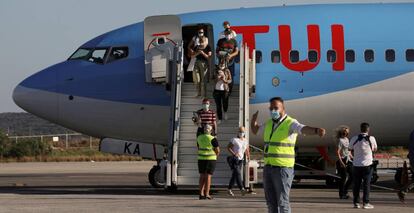Tour operators prepare to resume travel between Germany and Canary Islands
The Spanish region is pushing for passenger testing at origin and destination to avoid quarantines

Spain has been insisting for months on the need for safe travel corridors to prop up its flagging tourism industry, which has been devastated by the coronavirus crisis. After a summer described as dismal by many in the hospitality sector, the Spanish tourism industry is now finding an ally in tour operators who are pushing for less-stringent travel restrictions in countries such as Germany.
The British-German travel giant TUI, for instance, has decided to resume its flights from Germany to the Canary Islands, despite a recommendation from Berlin authorities not to travel to Spain. Starting on October 3, the company will offer trips to the islands, with additional guarantees in the event that a client contracts Covid-19, said a TUI spokesperson who spoke with EL PAÍS on Monday. Both TUI and the airline group Lufthansa want to see widespread use of fast Covid-19 tests as a way to ensure the safety of air links.
“Toward the end of the year, there is no other sun and sand destination in Europe. That is why TUI has pushed its decision forward, since it is expected that Germany will soon lift its warning about travel to the Canaries,” said a source from the Canary Islands government. “They are starting to program their vacation packages early because they need a few weeks to be fully operational.”
Tests instead of quarantines
Authorities in the Canary Islands, which are located off the western coast of Africa, want visitors to get tested for the virus before and after flying to their destination. This would bypass the need for tourists to self-isolate on their return from the islands, presumably making the Canaries more attractive, particularly now that the region’s high season is kicking off.
In early September, the German Foreign Ministry included the Canary Islands on its list of risk zones as the region had a seven-day cumulative incidence of the coronavirus of more than 50 cases for every 100,000 people. Even though the incidence remains the same, a TUI spokesperson said that until October 3, passengers may cancel their trips. “Or they can choose to go to the Canaries and stay at our hotels, because we feel that in recent days the [coronavirus] figures on the islands have progressed in a very positive way.”
The TUI spokesperson said that many German clients were asking why they could not travel to one of Germany’s favorite winter destinations. For now, those who do go must take a coronavirus test. And starting in October, returning visitors will have to quarantine for at least five days before taking the test.
But a source in the regional government of the Canaries said they are hoping for better conditions in the near future. “With countries that there is an agreement with, a negative test should eliminate the need for a quarantine upon return.”
Unified EU position
This measure is part of a wider set of proposals sent by the Canaries to the central executive in Madrid. The draft document, which EL PAÍS has seen, also proposes antigen tests, which are faster and cheaper than PCR testing, tracing passengers so their contacts can be tracked in the event of a positive case, and the introduction of safety protocols in stores and other business premises.
“It’s good to have specific deals with tour operators, but what we want are larger-scale agreements,” said a source in the regional government. “The tourism minister has our project on her desk and we are awaiting news.”
On Monday, Tourism Minister Reyes Maroto held an online meeting with European counterparts to seek a common response that might help reactivate safe travel on the continent. Maroto highlighted the need for homogenous criteria to apply to risk zones, including the use of “mutually recognized tests.” This, said the Spanish minister, would “prevent indiscriminate measures such as quarantines and travel restrictions.” The Spanish Foreign Ministry has also been working to reach European-wide deals along the same lines.
Spain’s summer season was dampened by fresh coronavirus outbreaks and advisories introduced by many countries that recommended against travel to Spain. The slowdown began in late July, when the United Kingdom introduced a quarantine for travelers arriving from the country.
English version by Susana Urra.
Tu suscripción se está usando en otro dispositivo
¿Quieres añadir otro usuario a tu suscripción?
Si continúas leyendo en este dispositivo, no se podrá leer en el otro.
FlechaTu suscripción se está usando en otro dispositivo y solo puedes acceder a EL PAÍS desde un dispositivo a la vez.
Si quieres compartir tu cuenta, cambia tu suscripción a la modalidad Premium, así podrás añadir otro usuario. Cada uno accederá con su propia cuenta de email, lo que os permitirá personalizar vuestra experiencia en EL PAÍS.
¿Tienes una suscripción de empresa? Accede aquí para contratar más cuentas.
En el caso de no saber quién está usando tu cuenta, te recomendamos cambiar tu contraseña aquí.
Si decides continuar compartiendo tu cuenta, este mensaje se mostrará en tu dispositivo y en el de la otra persona que está usando tu cuenta de forma indefinida, afectando a tu experiencia de lectura. Puedes consultar aquí los términos y condiciones de la suscripción digital.








































